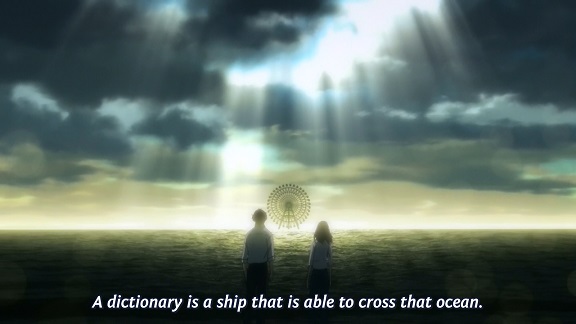
It’s a shame that one of the best series this year has had so little opportunity to finds its audience. As you know Bob, earlier this year Amazon signed a deal to get the exclusive rights to the Noitamina block of anime. At first this worked out great for them as the first series under the deal was Koutetsujou no Kabaneri, made by the studio behind Attack on Titan with a similar concept, which got a lot of attention. But then the next series was Battery, ostensibly a baseball series but actually about coming out as gay in small town Japan, which for some reason was much less popular. And the series after that, Fume Wo Amu was even less designed to get a mass audience: who’d want to watch a series about creating a dictionary? Especially if you have to get a subscription with yet another streaming service for it?
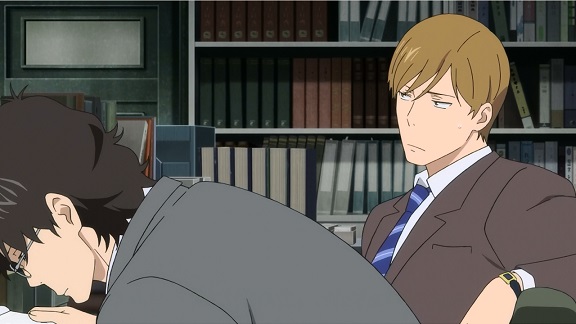
Which is a pity, because Fune Wo Amu is indeed one of the best series this year, a thoroughly mature workplace drama that is subtle in a way that anime often isn’t in depicting conversations and relationships. And the main relationship is the one between the two dictionary bros, the protagonist Mitsuya Majime and the man who recruited him for the dictionary editorial team when he saw he was a lousy salesman but had an unique way with words, Masashi Nishioka. The former has some form of mild social anxiety, finding it hard to talk to people, but being very precise with words while the latter is cocky and confident, if a bit unhappy to work in such an unpopular publishing department. You can see their personalities in everything, from how they sit to how they walk and talk. And though both change and find common ground in their work on the dictionary, the series never presents either one as wrong. Their personality is what it is and that’s alright.
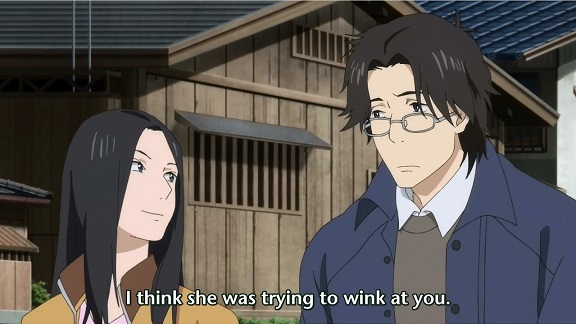
The other important relationship is the budding romance between Majime and the granddaughter of his landlord –who ships the two outrageously– Kaguya Hayashi. Hayashi is a Japanese chef in training when she first meets Majime and throughout the series she keeps her career going, eventually getting her own restaurant. I really like the way she and Majime interact, once they are in a proper relationship together: it feels natural, mature. With the usual anime romances being between high school students taking thirteen episodes to decide to hold hands, it’s nice to get a more adult version. Even if Majime still ends up writing her a love letter to confess. Which actually is so dense and literary written that it takes Hayashi an entire day to figure out it is a love letter.
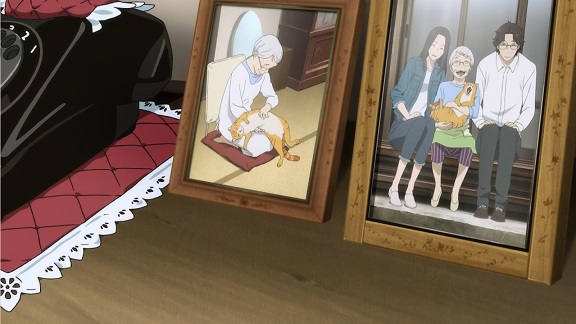
With episode eight, the series makes a thirteen year time leap. It’s an interesting decision and not one you expect in an eleven episodes series. It means skipping over all of the plot developments that were set up in the previous seven episodes, going straight to their resolution. Which means we missed most of the sweet romance building between Majime and Hayashi, going straight to them having been married for several years already, with both Hayashi’s grandmother and her cat having died in the meantime (we also don’t find out what happened with Nishioka and his girlfriend until the last episode). Disappointing as this is, it does pull the focus back on what the series is really about: the work on the dictionary. Having skipped the years of hard slog through the Japanese language collecting the words for inclusion, it means the series can now concentrate on the end spurt.
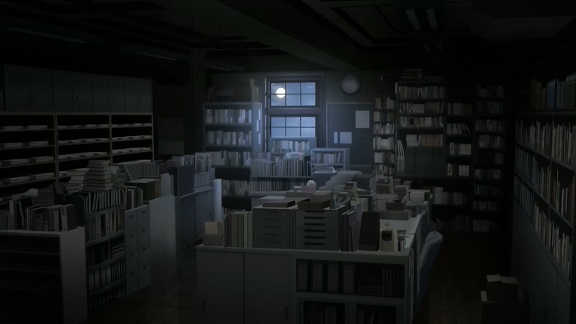
Which means that in the series we get to witness the entire birth process of a dictionary and find out why it is important, why the people working on it find it important. For any book nerd like me this is something that hits close to home, even if I’m not particulary interested in dictionaries myself. Fune Wo Amu for the most part manages to do this without preaching, just through showing the various people working on it go on about their business, dealing with minor crisises. This is one anime which truly believes in show, don’t tell, isn’t afraid to let viewers draw their own conclusions. That’s why it’s in my top five shows for this year.
This was day ten of the Twelve Days of Anime. Next: Hai to Gensou no Grimgar.
No Comments